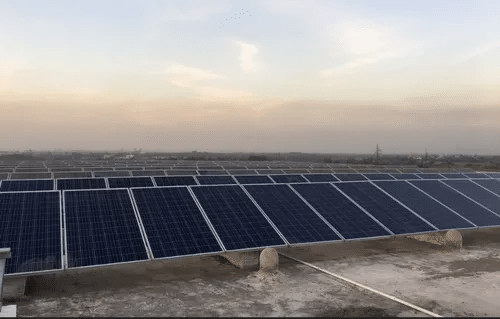Solar power is becoming increasingly affordable in Pakistan as the price per watt of solar panels continues to drop, reaching a new low of Rs28 per watt.
This dramatic decline in prices over the past year has attracted attention and enthusiasm from both consumers and businesses, particularly at a recent solar panel exhibition in Karachi, where numerous stalls and crowded buyers highlighted the growing interest in solar energy solutions.
The Federal Minister for Energy, Awais Leghari, recently announced that Pakistan imported 8,000 megawatts worth of solar panels over the past year. This impressive figure is comparable to 30-35% of the total electricity output generated by the massive Three Gorges Dam, one of the largest hydropower projects in the world.
The growing demand for solar panels in Pakistan has led to significant changes in the local market. The consistent decline in panel costs has made solar power an increasingly attractive alternative for homeowners, businesses, and industries looking to reduce their dependence on traditional energy sources, especially given the rising cost of electricity from the national grid.
Local suppliers, while currently dealing with fluctuating prices, are waiting in anticipation for solar panel rates to drop even further. They believe this trend could make solar power more accessible to a wider range of consumers, thereby accelerating the adoption of renewable energy across the country.
The increased interest in solar energy has not only impacted demand for panels but has also prompted companies to explore further investment opportunities within Pakistan’s solar industry.
As the country’s solar power market expands, there are now plans to establish a solar inverter manufacturing plant locally. This step could provide an added boost to the economy by reducing dependence on imported components and conserving foreign exchange.
The combination of lower solar panel prices and the potential for local production of solar inverters marks a positive step towards a more sustainable energy future for Pakistan.
Solar power is increasingly seen as a viable alternative to tackle the country’s energy challenges, and the declining costs make it possible for more people to take advantage of renewable energy.
As solar energy becomes more accessible, it has the potential to play a significant role in addressing Pakistan’s energy needs, reducing the pressure on conventional energy sources, and ultimately contributing to a cleaner environment.
With an increasing number of stakeholders now involved, Pakistan’s solar power market is poised for rapid growth, making renewable energy an important part of the country’s future.


